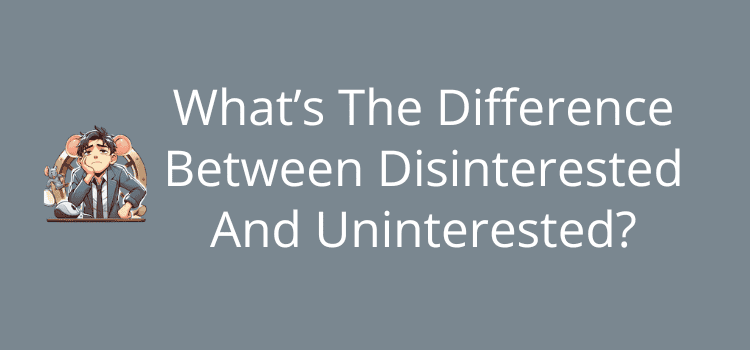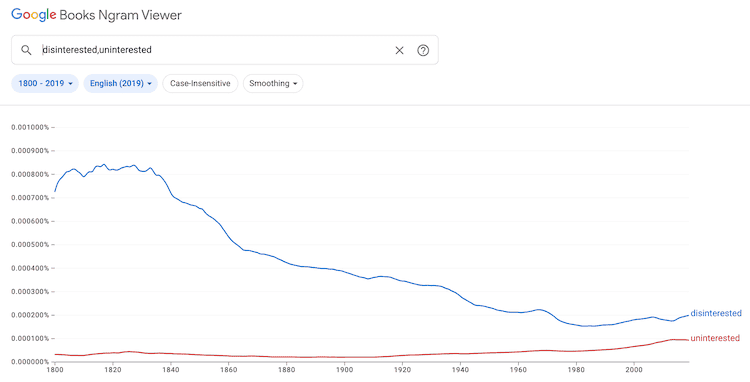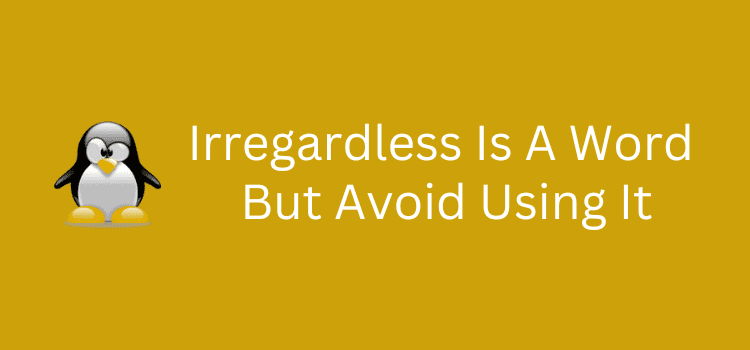
You might think that the two words, disinterested and uninterested, are synonyms.
In some contexts, yes, it’s possible to use either word because they both infer a lack of interest.
But in reality, there is a subtle difference in meaning between them.
One refers to a lack of interest due to impartiality, while the other means having no interest in something.
The difference between disinterested and uninterested
You should use disinterested when you want to convey the sense of someone being impartial or free from any self-interest or personal bias.
It is often used in the context of a professional, such as a judge, lawyer, or doctor performing their duties without personal interests.
When objectivity is essential, someone showing disinterest relates to having no personal stake and relying solely on the evidence.
A doctor treating a patient would show disinterest in a patient’s social status and concentrate on treating the symptoms.
A judge relies on only the evidence presented in court to reach a judgment and would be disinterested in rumors or circumstantial possibilities.
On the other hand, uninterested describes someone who lacks any interest or enthusiasm.
You can see it as a neutral stance without any view or bias, but it is more of an absence of any engagement.
You might say that some younger people are uninterested in politics because they don’t hold any views or find it unappealing.
For someone who is an avid football fan, they may be uninterested in reading poetry.
As I write this, I wonder if you are disinterested, uninterested, or interested in the semantics of this topic.
When to use – with examples
It’s interesting to note the progression of the use of the two words.
In the graph below, you can see the frequency of use is becoming almost equal after disinterested was the dominant word for many years.

That gives a sign that, for many writers, the two words are interchangeable.
In some cases and contexts where there is a general lack of interest or perhaps boredom, this is true.
The entire press corps seemed uninterested/disinterested in the minister’s long rambling speech.
I worry because my son is uninterested/disinterested in reading and only watches videos.
However, there are certain contexts when it’s better to choose the appropriate word.
Expressing a lack of bias and impartiality.
A good political reporter should be disinterested in promoting a specific or personal viewpoint and present the news objectively without personal bias.
An excellent referee in any professional sport is disinterested in who wins or loses.
Expressing a total lack of preference or boredom.
His presentation had a flat ending because the audience was uninterested in asking any questions.
The company’s failure was mainly due to it being uninterested in complaints about product quality.
Different prefixes, different meaning
If the only difference between the two words is a prefix, the change in meaning must lie there.
And it does.
The prefix un- denotes the absence of a quality or state. In other words, it generally means not.
But the prefix dis- is more nuanced.
Yes, it can indicate negation. But it can also denote an absence of an action or state or the removal of something.
Other meanings include separation, expulsion, or the intensification of an unpleasant or unattractive action.
Think about the words disorganized and unorganized.
The first means someone is not only unorganized but also probably messy or cluttered. However, unorganized simply implies a lack of organization.
Another example is unproven and disproven.
Unproven means that something is not tried and tested or shown to be true. But disproven indicates that something is demonstrated to be false.
You can probably think of more words that can use both prefixes, such as unsatisfied and dissatisfied, disordered and unordered, or disable and unable.
So, yes, there is a difference between the two prefixes, even if it is sometimes subtle.
Options to avoid possible confusion
Because both adjectives are so close in meaning, making the correct choice is not always straightforward.
Sometimes, it’s better to use words or phrases that are either positive or make a sentence much easier to understand.
Here are a few possibilities.
His presentation had a flat ending because no one in the audience was interested in asking questions.
I worry because my son thinks reading is boring and only watches videos.
The children lost interest in the educational word game after a while.
I’m totally detached from politics, so I don’t have anything to say about the election.
I don’t care what we have for dinner tonight, so choose whatever you like.
The magistrate was unmoved by the defendant’s tears.
There are many possibilities you can use to express a lack of interest or impartiality more clearly.
What word should you use?
Yes, there is a difference in meaning.
But it is sometimes such a fine point of distinction that you could use either one.
In practical use, you more often see disinterested used to cover both meanings. While not always 100% correct, it is common.
But if you want to make a distinction in your writing, at least you now know the basics so you can make the right decision.
Summary
There are a lot of word pairs that can cause confusion for writers, so you need to be sure you make the right choices.
Classic examples are affect and effect, between and among, and regardless and irregardless.
The only way to avoid any possible error or misuse is to be extra careful when proofreading or editing.
Be on your guard for words that sound the same or seem to be synonyms.
If you are not sure, be interested and check your dictionary.
Related Reading: Make Sure And Ensure: Which One Should You Use?



